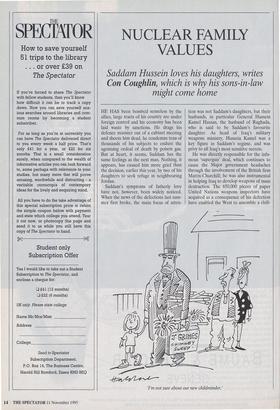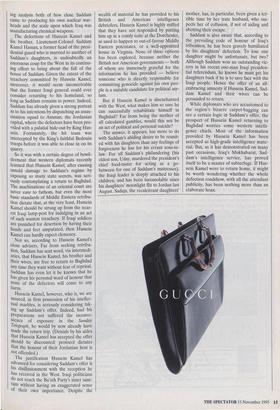NUCLEAR FAMILY VALUES
Saddam Hussein loves his daughters, writes
C©n Coughlin, which is why his sons-in-law
might come home
HE HAS been bombed senseless by the allies, large tracts of his country are under foreign control and his economy has been laid waste by sanctions. He drags his defence minister out of a cabinet meeting and shoots him dead, he condemns tens of thousands of his subjects to endure the agonising ordeal of death by poison gas. But at heart, it seems, Saddam has the same feelings as the next man. Nothing, it appears, has caused him more grief than the decision, earlier this year, by two of his daughters to seek refuge in neighbouring Jordan.
Saddam's symptoms of fatherly love have not, however, been widely noticed. When the news of the defections last sum- mer first broke, the main focus of atten- tion was not Saddam's daughters, but their husbands, in particular General Hussein Kamel Hassan, the husband of Raghada, who is said to be Saddam's favourite daughter. As head of Iraq's military weapons ministry, Hussein Kamel was a key figure in Saddam's regime, and was privy to all Iraq's most sensitive secrets.
He was directly responsible for the infa- mous `supergun' deal, which continues to cause the Major government headaches through the involvement of the British firm Matrix-Churchill; he was also instrumental in helping Iraq to develop weapons of mass destruction. The 650,000 pieces of paper United Nations weapons inspectors have acquired as a consequence of his defection have enabled the West to assemble a chill- I'm not sure about our new childminder.' ing analysis both of how close Saddam came to producing his own nuclear war- heads and the scale upon which Iraq was manufacturing chemical weapons.
The defections of Hussein Kamel and his brother, Lieutenant-Colonel Saddam Kamel Hassan, a former head of the presi- dential guard who is married to another of Saddam's daughters, is undoubtedly an enormous coup for the West in its continu- ing effort to bring about the fall of the house of Saddam. Given the extent of the treachery committed by Hussein Kamel, moreover, it would seem inconceivable that the former Iraqi general could ever consider returning to his homeland, so long as Saddam remains in power. Indeed, Saddam has already given a strong portent as to his intentions by dispatching an assas- sination squad to Amman, the Jordanian capital, where the defectors have been pro- vided with a palatial hide-out by King Hus- sein. Fortunately, the hit team was intercepted by the King's faithful Bedouin troops before it was able to close in on its quarry.
So it was with a certain degree of bewil- derment that western diplomats recently learned that Hussein Kamel, after causing untold damage to Saddam's regime by exposing so many state secrets, was seri- ously contemplating a return to Baghdad. The machinations of an oriental court are never easy to fathom, but even the most basic standards of Middle Eastern retribu- tion dictate that, at the very least, Hussein Kamel should be strung up from the near- est Iraqi lamp-post for indulging in an act of such wanton treachery. If Iraqi soldiers are punished for desertion by having their hands and feet amputated, then Hussein Kamel can hardly expect clemency. Not so, according to Hussein Kamel's Close advisers. Far from seeking retribu- tion, Saddam has sent word, via intermedi- aries, that Hussein Kamel, his brother and their wives, are free to return to Baghdad any time they want without fear of reprisal. Saddam has even let it be known that he has given his personal word of honour that none of the defectors will come to any harm.
Hussein Kamel, however, who is, we are assured, in firm possession of his intellec- tual marbles, is seriously considering tak- ing up Saddam's offer. Indeed, had his preparations not suffered the inconve- nience of exposure in the Sunday Telegraph, he would by now already have made the return trip. (Denials by his aides that Hussein Kamel has accepted the offer should be discounted: protocol dictates that the honour of their Jordanian host is not offended.) The justification Hussein Kamel has advanced for considering Saddam's offer is his disillusionment with the reception he has received in the West. Iraqi politicians do not reach the Ba'ath Party's inner sanc- tum without having an exaggerated sense of their own importance. Despite the wealth of material he has provided to his British and American intelligence debriefers, Hussein Kamel is highly miffed that they have not responded by putting him up in a comfy suite at the Dorchester, as used to happen to out-of-favour Middle Eastern potentates, or a well-appointed house in Virginia. None of these options has been explored, because neither the British nor American governments — both of whom are immensely grateful for the information he has provided — believe someone who is directly responsible for committing genocide against his own peo- ple is a suitable candidate for political asy- lum.
But if Hussein Kamel is disenchanted with the West, what makes him so sure he can successfully rehabilitate himself in Baghdad? Far from being the mother of all calculated gambles, would this not be an act of political and personal suicide? The answer, it appears, has more to do with Saddam's abiding desire to be reunit- ed with his daughters than any feelings of forgiveness he has for his errant sons-in- law. For all Saddam's philandering (his eldest son, Uday, murdered the president's chief food-taster for acting as a go- between for one of Saddam's mistresses), the Iraqi leader is deeply attached to his children, and has been inconsolable since his daughters' moonlight flit to Jordan last August. Sadaja, the recalcitrant daughters' mother, has, in particular, been given a ter- rible time by her irate husband, who sus- pects her of collusion, if not of aiding and abetting their escape.
Saddam is also aware that, according to the prevailing code of honour of Iraq's tribesmen, he has been gravely humiliated by his daughters' defection. To lose one daughter might be unfortunate, but two? Although Saddam won an outstanding vic- tory in his recent one-man Iraqi presiden- tial referendum, he knows he must get his daughters back if he is to save face with the Iraqi people. Hence the offer of an all- embracing amnesty if Hussein Kamel, Sad- dam Kamel and their wives can be persuaded to return.
While diplomats who are accustomed to the region's bizarre carpet-bagging can see a certain logic in Saddam's offer, the prospect of Hussein Kamel returning to Baghdad worries some western intelli- gence chiefs. Most of the information provided by Hussein Kamel has been accepted as high-grade intelligence mate- rial. But, as it has demonstrated on many past occasions, Iraq's Mokhabarat, Sad- dam's intelligence service, has proved itself to be a master of subterfuge. If Hus- sein Kamel were to return home, it might be worth wondering whether the whole defection roadshow, with all the attendant publicity, has been nothing more than an elaborate hoax.



















































































 Previous page
Previous page